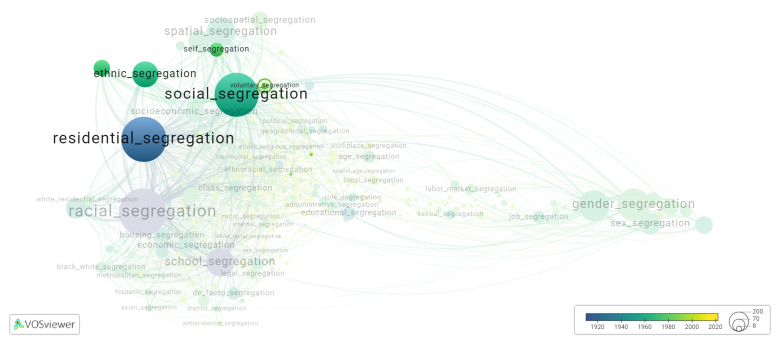Voluntary segregation
Date and country of first publication[1][edit | edit source]
1995
South Africa
Definition[edit | edit source]
Voluntary segregation is the act of separating oneself from a particular group or community based on personal choice. This could be for reasons such as cultural differences, personal preferences, or seeking out like-minded individuals. It is different from forced or involuntary segregation, which is imposed by external factors such as laws or societal structures. Voluntary segregation can sometimes be seen as a form of self-preservation or self-expression, but it can also contribute to societal divides and perpetuate stereotypes.
See also[edit | edit source]
Related segregation forms[edit | edit source]
Voluntary segregation is frequently discussed in the literature with the following segregation forms:
residential segregation, social segregation, self segregation, ethnic residential segregation, compulsory residential segregation, voluntary residential segregation, forced segregation, spatial segregation, ethnic segregation, socioeconomic segregation, racial segregation

This visualization is based on the study The Multidisciplinary Landscape of Segregation Research.
For the complete network of interrelated segregation forms, please refer to:
References[edit | edit source]
Notes[edit | edit source]
- ↑ Date and country of first publication as informed by the Scopus database (December 2023).
At its current state, this definition has been generated by a Large Language Model (LLM) so far without review by an independent researcher or a member of the curating team of segregation experts that keep the Segregation Wiki online. While we strive for accuracy, we cannot guarantee its reliability, completeness and timeliness. Please use this content with caution and verify information as needed. Also, feel free to improve on the definition as you see fit, including the use of references and other informational resources. We value your input in enhancing the quality and accuracy of the definitions of segregation forms collectively offered in the Segregation Wiki ©.
Voluntary segregation appears in the following literature[edit | edit source]
Maharaj B. (1995). The local state and residential segregation: Durban and the prelude to the group areas act. South African Geographical Journal, 77(1), 33-41. https://doi.org/10.1080/03736245.1995.9713586
Satina B., Solmon M.A., Cothran D.J., Loftus S.J., Stockin-Davidson K. (1998). Patriarchal consciousness: Middle school students' and teachers' perspectives of motivational practices. Sport, Education and Society, 3(2), 181-200. Carfax Publishing Company.https://doi.org/10.1080/1357332980030204
Buttny R. (1999). Discursive constructions of racial boundaries and self segregation on campus. Journal of Language and Social Psychology, 18(3), 247-268. SAGE Publications Inc..https://doi.org/10.1177/0261927X99018003002
Maharaj B. (2003). ‘Co operation…consultation and consent’: The failure of voluntary residential segregation in durban (1920 1945). South African Geographical Journal, 85(2), 134-143. https://doi.org/10.1080/03736245.2003.9713793
Firman T. (2004). New town development in Jakarta Metropolitan Region: A perspective of spatial segregation. Habitat International, 28(3), 349-368. Elsevier Ltd.https://doi.org/10.1016/S0197-3975(03)00037-7
Tannenbaum M., Abugov N., Ravid D. (2006). Hebrew language narratives of Yiddish speaking ultra orthodox girls in Israel. Journal of Multilingual and Multicultural Development, 27(6), 472-490. https://doi.org/10.2167/jmmd475.1
Tannenbaum M., Abugov N., Ravid D. (2007). A developmental perspective on Hebrew narrative production in an ultra Orthodox population. Pragmatics and Cognition, 15(2), 347-378. https://doi.org/10.1075/pc.15.2.07tan
Teixeira C. (2007). Residential experiences and the culture of suburbanization: A case study of Portuguese homebuyers in Mississauga. Housing Studies, 22(4), 495-521. https://doi.org/10.1080/02673030701387622
Gans H.J. (2008). Involuntary segregation and the ghetto: Disconnecting process and place. City and Community, 7(4), 353-357. https://doi.org/10.1111/j.1540-6040.2008.00271_2.x
Merry M.S. (2012). Equality, selfrespect and voluntary separation. Critical Review of International Social and Political Philosophy, 15(1), 79-100. https://doi.org/10.1080/13698230.2010.528239
Merry M.S. (2012). Segregation and Civic Virtue. Educational Theory, 62(4), 465-486. https://doi.org/10.1111/j.1741-5446.2012.00457.x
Pérez M.R., Bayona-i-Carrasco J., Rúbies I.P. (2012). Spatial patterns of residential segregation in the metropolitan area of Barcelona: Voluntary segregation of the upper groups; [Patrones espaciales de la segregación residencial en la región metropolitana de barcelona: Pautas de segregación de los grupos altos]. Scripta Nova, 16(), 741-798. https://doi.org/
McCrudden C. (2012). Religion and education in Northern Ireland: Voluntary segregation reflecting historical divisions. Law, Religious Freedoms and Education in Europe, 133-152. Ashgate Publishing Ltd.https://doi.org/
van Leeuwen B. (2014). Urban civility or urban community? A false opposition in Richard Sennett's conception of public ethos. European Journal of Social Theory, 17(1), 3-23. https://doi.org/10.1177/1368431013484002
Ibraimovic T., Masiero L. (2014). Do Birds of a Feather Flock Together? The Impact of Ethnic Segregation Preferences on Neighbourhood Choice. Urban Studies, 51(4), 693-711. https://doi.org/10.1177/0042098013493026
Harris R., Johnston R., Manley D. (2017). The changing interaction of ethnic and socio economic segregation in England and Wales, 1991 2011. Ethnicities, 17(3), 320-349. SAGE Publications Ltd.https://doi.org/10.1177/1468796815595820
Obeng-Odoom F. (2017). The gated housing hierarchy. Property, Place and Piracy, 187-201. CRC Press.https://doi.org/10.4324/9781315180731
Boschman S., Kleinhans R., van Ham M. (2017). Ethnic differences in realising desires to leave urban neighbourhoods. Journal of Housing and the Built Environment, 32(3), 495-512. Springer Netherlands.https://doi.org/10.1007/s10901-016-9524-3
Li S.-M., Hao P. (2017). Socio spatial differentiation of permanent Hong Kong residents and new immigrants from mainland China. Migration in Post-Colonial Hong Kong, 36-57. Taylor and Francis.https://doi.org/10.4324/9781315466699
Li S.-M., Hao P. (2017). Socio spatial differentiation of permanent Hong Kong residents and new immigrants from mainland China. Migration in Post-Colonial Hong Kong, 36-57. Taylor and Francis.https://doi.org/10.4324/9781315466699
Warren R.L. (2017). Politics and African American ghettos. Politics and African-American Ghettos, 1-214. Taylor and Francis.https://doi.org/10.4324/9781315126784
Tagg B. (2018). Men’s netball or mixed gender indoor netball?. Sport in Society, 21(9), 1400-1415. Routledge.https://doi.org/10.1080/17430437.2017.1388790
Zadorin M.Y., Kotlova E.S. (2019). The 'hybrid model' of Norway's ethnic policy in its Northern counties: A key to stable interethnic relations. Baltic Region, 11(2), 4-16. Immanuel Kant Baltic Federal University.https://doi.org/10.5922/2079-8555-2019-2-1
Lim T., Leong C.-H., Suliman F. (202). Managing Singapore’s residential diversity through Ethnic Integration Policy. Equality, Diversity and Inclusion, 39(2), 109-125. Emerald Group Holdings Ltd..https://doi.org/10.1108/EDI-05-2019-0168
Gil R., Marion J. (2022). Why Did Firms Practice Segregation? Evidence from Movie Theaters during Jim Crow. Journal of Law and Economics, 65(4), 635-663. University of Chicago Press.https://doi.org/10.1086/720904
Nasehi S., Yavari A., Salehi E., Emmanuel R. (2022). Role of local climate zone and space syntax on land surface temperature (case study: Tehran). Urban Climate, 45(), -. Elsevier B.V..https://doi.org/10.1016/j.uclim.2022.101245
